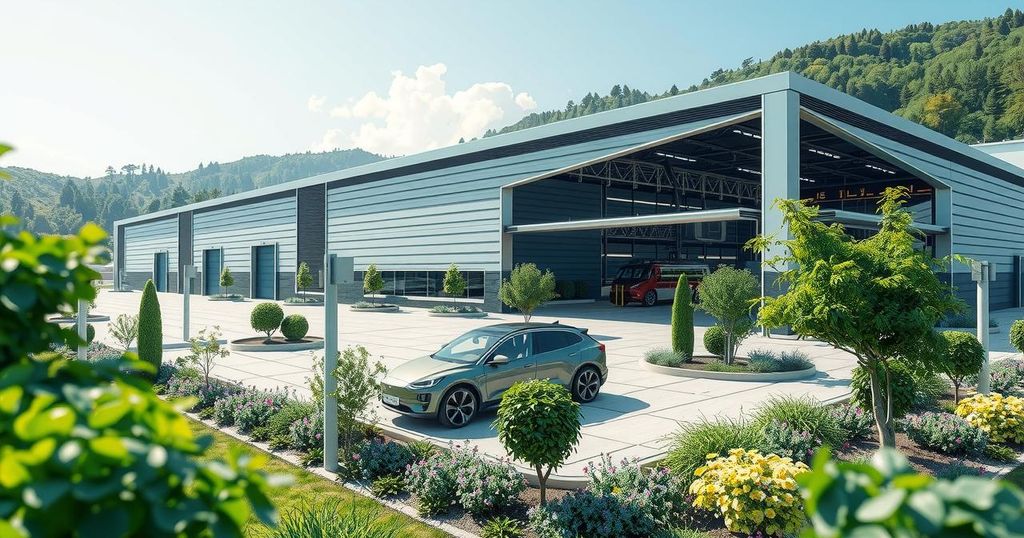BYD Begins Assembling EVs at New Factory in Brazil
- BYD plans to assemble electric vehicles in Bahia, Brazil this month.
- The goal is to assemble 50,000 vehicles by 2025, using imported kits.
- Final regulatory approvals for the factory are still pending.
- Earlier, BYD shipped about 22,000 vehicles from China to Brazil before tax increases.
- The Bahia factory has received criticism and delays; full operations may not start until 2026.
BYD Begins EV Assembly Amid Tariff Challenges
Chinese automaker BYD has officially announced that it will begin assembling electric vehicles in its new factory located in Bahia, Brazil, this month. This strategic move represents a critical step towards the company’s goal of assembling 50,000 vehicles by the year 2025. According to Alexandre Baldy, BYD’s senior vice president for Brazil, the assembly process will involve the use of imported kits, minimizing the reliance on fully imported vehicles, especially in light of increasing tariffs in the region.
Operational Timeline and Challenges Ahead
However, Baldy also mentioned that the factory is still awaiting final regulatory approvals, which could affect the projected timeline. Earlier this year, BYD faced a significant obstacle as it ramped up imports of finished vehicles, exporting around 22,000 units from China to Brazil before the new import taxes took effect on July 1. The new facility, which is built on the site of a former Ford plant that BYD acquired in 2023, has faced its fair share of criticism and delays, suggesting it may only be fully operational by the end of 2026 – although Baldy anticipates full production could commence in July 2026.
Decade-Long Strategy for Sustainable Growth
BYD’s strategy in Brazil encompasses a broader vision that goes back nearly a decade. Since starting its journey in Brazil in 2014 with an investment of $400 million for its first battery factory, the company has diversified its focus to include public transportation infrastructure. For instance, the construction of a 20-kilometer SkyRail monorail in Salvador is aimed at serving 150,000 daily riders. This comprehensive approach is in line with BYD’s global strategy for creating a “Zero Emissions Energy Ecosystem,” which combines electric vehicles, energy storage, and public transit solutions, surpassing a narrow focus on just passenger cars.
Tariff Pressures Influence Manufacturing Decisions
Brazil’s evolving tariff strategy has introduced an urgent timeline for BYD’s manufacturing transition, with new tariffs on electric vehicles expected to ascend from 0% to a maximum of 35% by July 2026. This reintroduction of tariffs has compelled the company to expedite its assembly operations, hence its frontloading of imports, exemplified by the shipping of 7,300 EVs to Brazil as part of its largest single export operation to the country in May 2025. Yet, the accelerated approach has not gone unnoticed by local industry groups, such as ANFAVEA, which have criticized BYD’s inclination to maximize imports while working on local production capabilities.
Labor Controversies and ESG Risks
Nonetheless, labor issues have emerged as a serious concern, overshadowing BYD’s expansion ambitions and presenting significant ESG risks. Reports indicate that Brazilian authorities have identified serious violations, affecting over 160 Chinese workers at the Bahia site. Allegations include the withholding of passports, overwork, and unsatisfactory living conditions described as “slavery-like.” Additionally, there is a lawsuit in progress that could see prosecutors impose penalties up to $45 million, raising questions about legal compliance and operational sustainability for foreign companies in Brazil.
Navigating Compliance and International Standards
In light of these challenges, BYD must navigate a complex landscape of expanding their operations while maintaining adherence to local labor standards. The scrutiny beings not just from Brazilian authorities but also reflects broader implications for Chinese investments across the region as questions of compliance and sustainability continue to surface. The situation serves as a stark reminder of the rigorous labor enforcement regime present in Brazil, which is one of the most stringent in Latin America, emphasizing the importance of compliance for ongoing operations.
BYD’s entry into the Brazilian electric vehicle market represents a significant move towards local assembly and reducing reliance on imports. The company’s decade-long strategic development in Brazil, backed by multimillion-dollar investments, is now complicated by impending tariffs and labor controversies. As BYD aims to begin full production in 2026, both the operational timeline and labor practices will demand careful navigation to meet local and international standards, ultimately determining BYD’s long-term success in the region.




Post Comment